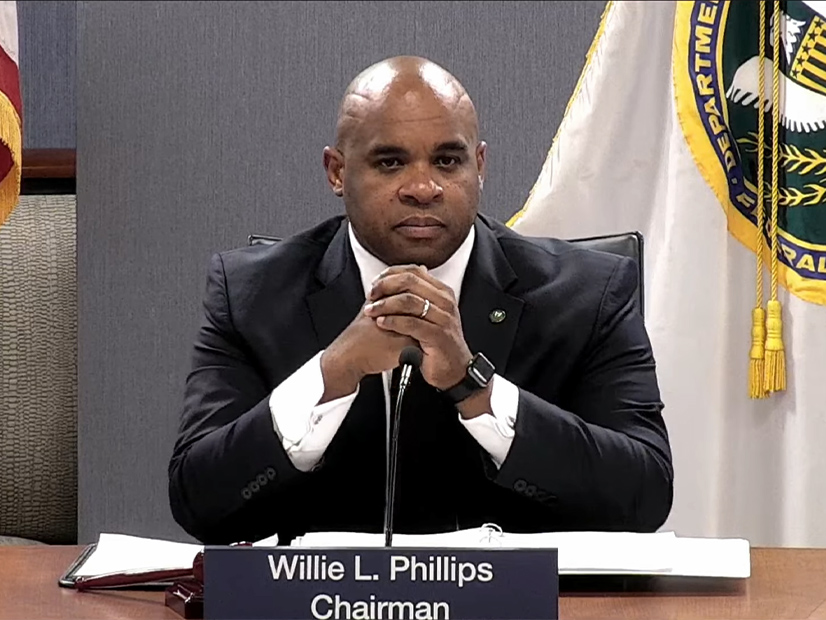FERC on Thursday approved NERC’s proposed plan for registering owners and operators of inverter-based resources (IBRs) (RD22-4).
While the commission declined to incorporate any of industry stakeholders’ suggested changes to the plan, it reminded them there is still considerable work left to shape the final registration framework and encouraged them to raise their concerns during the ERO’s stakeholder process.
NERC’s registration proposal originated from a FERC order in November requiring the ERO to develop a work plan for identifying and registering owners and operators of IBRs that are connected to the grid and “in the aggregate have a material impact” on reliable operation but are not currently required to register with NERC. (See FERC Addresses IBRs in Multiple Orders.)
The commission was motivated by concerns over the ongoing transition from conventional generation resources to IBRs like wind and solar facilities. Specifically, current rules defining which resources qualify as part of the Bulk Electric System — and thus must register with NERC, follow its reliability standards and respond to its alerts — do not apply to many smaller IBRs.
NERC submitted its registration strategy in February, proposing a three-stage process: revise its Rules of Procedure (ROP) to create a new registered entity function, generator owner-IBR (GO-IBR), within 12 months of FERC’s approval of the plan; identify candidates for GO-IBR registration with 24 months of approval; and register GO-IBRs within 36 months of approval.
The GO-IBR category would include IBRs that have an aggregate nameplate capacity of 20 to 75 MVA interconnected at a voltage of at least 100 kV, or an aggregate nameplate capacity of at least 20 MVA interconnected at less than 100 kV. IBRs connected to the local distribution system would not be included; neither would IBRs that are distributed energy resources. NERC said it would also consider developing reliability standards to apply to GO-IBRs.
The ERO’s original submission neglected to mention registration of generator operators; at FERC’s prodding, NERC said in March that it intended GO-IBR to refer to both owners and operators of IBRs, but it acknowledged that this practice would differ from its use of separate terms for existing registered generators and could create confusion. NERC pledged to consider “other potential designations” when revising the ROP.
Stakeholders were generally supportive of NERC’s proposal, but some asked the commission to modify the ERO’s plans. For example, the American Clean Power Association (ACP) and the Solar Energy Industries Association (SEIA) objected to the idea of only registering IBRs with an aggregate material impact on reliability, suggesting that this measure could result in the registration of IBRs that “use equipment and settings that ensure that they ride through grid disturbances and avoid reliability concerns that were observed in past events.”
Solar energy developer Pine Gate Renewables urged the commission to ensure that NERC’s work plan does not place IBRs at a competitive disadvantage compared to conventional generation, noting that the commission has previously ordered that reliability standards not create undue advantages for one competitor over another. Pine Gate, along with SEIA and ACP, also argued that older IBRs may be unable to meet the standards’ performance requirements and asked for a registration exemption for IBRs with older equipment that cannot be easily updated.
In response to these objections, FERC determined that issuing specific restrictions on NERC’s ROP or standards development processes would be outside its authority. Instead, it urged stakeholders to participate in the normal feedback process to influence the ERO’s actions.
During FERC’s monthly open meeting Thursday, acting Chair Willie Phillips said reliability is “job No. 1 for the commission” and described the IBR order as an important step in dealing with the “projected addition over the next decade of an unprecedented proportion” of IBRs.
Commissioner Allison Clements said she looks forward to “engaging” with the ERO as work continues on the registration framework.
“I hope that NERC’s substantive filing on its registration approach, which is still to come, ensures an effective registration framework but does not compromise IBRs’ ability to provide the reliability services they are capable of providing, including … reactive power, black start and fast frequency response,” Clements said.




